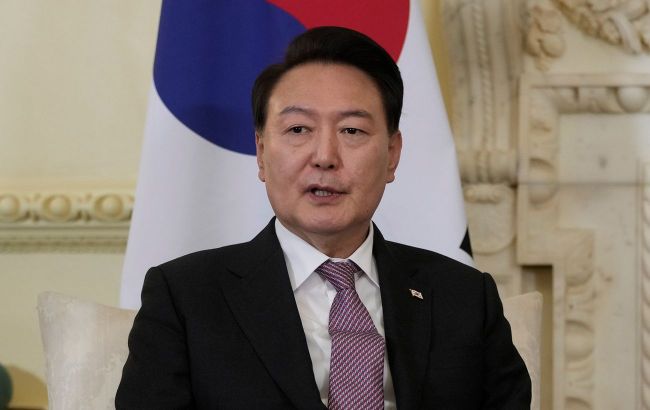South Korea court issues arrest warrant for ousted president
 The ousted president of the Republic of Korea, Yoon Suk Yeol (photo: Getty Images)
The ousted president of the Republic of Korea, Yoon Suk Yeol (photo: Getty Images)
In the Republic of Korea, a court has allowed authorities to detain President Yoon Suk Yeol as part of a criminal investigation into his decree to impose martial law. This marks the first time in the country's history that a sitting president has been placed under arrest, reports Reuters.
The Corruption Investigation Office for High-ranking Officials (CIO) confirmed that the Seoul Western District Court approved an arrest warrant issued at the request of investigators probing the brief imposition of martial law by President Yoon Suk Yeol.
The ousted president is under investigation on charges of being the leader of an uprising (rebellion). This is one of the few criminal charges from which the President of South Korea has no immunity. A separate case regarding impeachment is being heard in the Constitutional Court.
The current arrest warrant is valid until January 6 and gives investigators only 48 hours to hold Yoon in custody after his arrest. After that, they must decide whether to request a new arrest warrant or release him.
According to Yonhap news agency, after his arrest, President Yoon will be held at the Seoul Detention Center.
Yoon's lawyer, Yoon Kab-keun, called the arrest warrant unlawful and invalid, arguing that under the law, the Prosecutor General does not have the authority to request the issuance of such a warrant. He stated that the president's legal team would file a petition with the Constitutional Court to suspend the warrant.
The district court issued the warrant due to the possibility that Yoon might fail to appear without a valid reason, as well as significant grounds to suspect him of committing a crime.
The arrest warrant for the sitting president is unprecedented and deepens the political crisis gripping the Republic of Korea, the fourth-largest economy in Asia and a key ally of the US.
Hundreds of Yoon's supporters gathered outside his residence on December 31 to protest the issuance of the warrant, with some clashing with the police.
Further process is uncertain
It is currently unclear when and how the arrest warrant for Yoon will be executed. The Presidential Security Service stated that they would consider the arrest warrant under proper legal procedures. The court has also approved a warrant to search the former president's residence.
Earlier, the police attempted but were unable to search Yoon's office as part of the investigation, as the presidential security service blocked access.
At present, the prosecution has filed charges against three high-ranking officials in the Ministry of Defense due to Yoon's declaration of martial law.
Charges in the martial law case have also been brought against former Defence Minister Kim Yong-hyun, with the first hearing scheduled for January 16, as well as against Yeo In-hyung, chief of Defense Counterintelligence Command, and Lee Jin-woo, commander of the Capital Defense Command. It is expected that more charges will be filed.
On Tuesday, as part of the investigation, authorities conducted searches at the offices of military counterintelligence.
Attempted coup in South Korea
On December 3, the then-President of the Republic of Korea, Yoon Suk Yeol, declared a state of martial law in the country. The president intended to prohibit political activities and censor the media, marking the first such order since the 1980s.
The South Korean parliament rejected the decision to impose martial law, and protesters clashed with the police in the streets. Due to the tense situation, the president rescinded the martial law, which lasted about six hours.
On December 14, parliament declared Yoon's impeachment. He was removed from office, and his powers were transferred to the country's prime minister, Han Duck-soo.
Han became the acting president, but on December 27, he was also impeached after he refused to approve the judges to the Constitutional Court appointed by the parliament.
The new acting president became Finance Minister Choi Sang-mok.
The next hearing in Yoon's case at the Constitutional Court is scheduled for Friday, January 3.
Kim Yong-min, a member of the opposition Democratic Party, which holds the majority in parliament and initiated the impeachment vote against Yoon, stated on Tuesday: "The process of executing the warrant and the investigation may be very complex," urging investigators to immediately carry out the warrants.
The investigation revealed that Yoon allowed the military to shoot at protesters blocking the entrance to parliament.
Additionally, on December 27, the Constitutional Court began considering the case against Yoon Suk Yeol regarding the impeachment declaration.
On December 30, investigators requested an arrest warrant for the suspended president.

